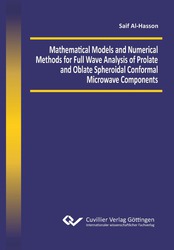| Areas | |
|---|---|
| Serie de libros (97) |
1381
|
| Nachhaltigkeit |
3
|
| Gesundheitswesen |
1
|
| Letra |
2370
|
| Ciencias Naturales |
5407
|
| Ciencias Ingeniería |
1798
|
| Ingeniería | 292 |
| Ingeniería mecánica y de proceso | 863 |
| Ingeniería eléctrica | 690 |
| Mineria y metalurgía | 30 |
| Arquitectura e ingeniería civil | 75 |
| General |
98
|
|
Leitlinien Unfallchirurgie
5. Auflage bestellen |
|
Erweiterte Suche
Mathematical Models and Numerical Methods for Full Wave Analysis of Prolate and Oblate Spheroidal Conformal Microwave Components (Tienda española)
Saif Al-Hasson (Autor)Previo
Indice, PDF (89 KB)
Lectura de prueba, PDF (670 KB)
Conformal components are used nowadays at higher rate than ever before. They can be found in curved mobile phones, communication, navigation, and imaging systems in land, water, air, and space vehicles. The integration of those components within the external structure became of significant importance for aerodynamic, electromagnetic, aesthetic, or
physical reasons. As a result, many mathematical models were previously developed to analyze and optimize such conformed devices. In this thesis, we contributed to this field by developing various models for full wave analysis of spheroidal components.
As a starting point, mathematical formulas for conforming antennas on oblate and prolate spheroids were obtained. Those conformation methods were validated by conforming many antennas on spheroidal surfaces. They were then used to formulate Method of Moments equations with spheroidally curved current functions for analyzing wire antennas of random
shape conformed to spheroids in the frequency domain. The complete model was applied to a conformal Archimedean spiral antenna on an oblate spheroid and showed that the conformed spiral has similar current distribution as its planar counterpart but produces an unsymmetrical radiation pattern. The obtained model was then extended to spheroidal multi-layer structures by integrating the spheroidal dyadic Green’s Function within its mathematical derivation. However, due to a detected divergence in that function, the model couldn’t be implemented.
On the side of time based analysis methods, a Finite Difference Time Domain method was developed for closed oblate and prolate spheroidal structures. Alternative formulas for the structure’s singularities and the condition of numerical stability were derived as well. The obtained model was then validated and used to characterize spheroidal cavities in the time and frequency domains. The method was extended later to unbounded spheroidal domain by deriving the Absorbing Boundary Conditions using the One Way Wave method. The whole model was then applied to characterize a patch antenna conformed to a prolate spheroid. Finally, an analytical solution for the transient fields in spherical multilayer media energized by spherical harmonics source and an algorithm for tracing back the path of all the reflected waves were obtained. The model was applied to different multilayer structures where the transient response was obtained and validated against a numerical solution.
| ISBN-13 (Impresion) | 9783954047963 |
| ISBN-13 (E-Book) | 9783736947962 |
| Formato | A5 |
| Idioma | Inglés |
| Numero de paginas | 158 |
| Laminacion de la cubierta | mate |
| Edicion | 1 Aufl. |
| Lugar de publicacion | Göttingen |
| Lugar de la disertacion | Braunschweig |
| Fecha de publicacion | 29.08.2014 |
| Clasificacion simple | Tesis doctoral |
| Area |
Ingeniería
|
| Palabras claves | Spheroidal, Conformal, Prolate, Oblate |








